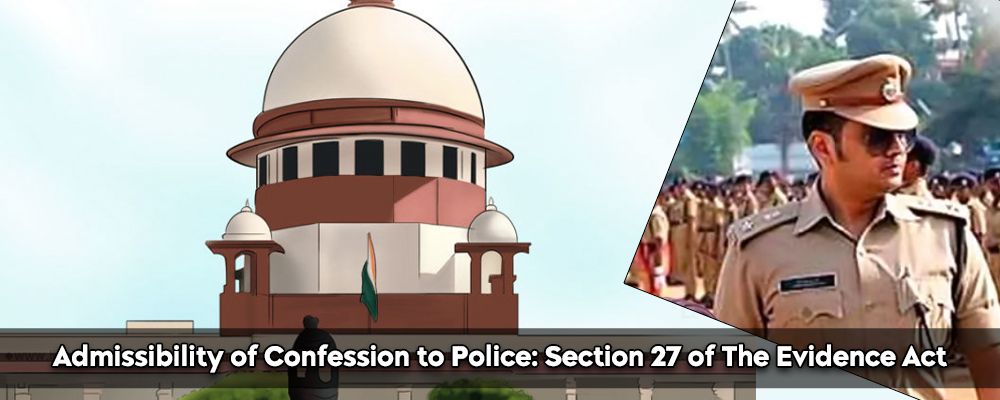A key clause of the Indian Evidence Act of 1872, Section 27, deals with the admissibility of findings that result from information provided by an accused person during an investigation. It establishes a crucial concept, namely that such findings can only be used against a person if they had been under investigation for a crime and in the police’s custody when they made the confession.
Section 27: Indian Evidence Act
This section effectively addresses the admissibility of data and findings resulting from comments or admissions made by a suspect while they were being held by the police. If certain requirements are completed, it allows the prosecution to introduce such information in court.
Need A Legal Advice
The internet is not a lawyer and neither are you. Talk to a real lawyer about your legal issue

Important Ingredients of Section 27 of the Evidence Act
- The first ingredient of Section 27 is that the individual giving the information must be accused of a crime. This suggests that the clause does not apply to people who are only witnesses to a crime or who are not otherwise suspected of having committed one.
- The second ingredient stipulates that the source of the information must be in a police officer’s custody. Accordingly, Section 27 does not permit the admission of a confession or statement given by the accused while they are not in the custody of the police.
- The third ingredient states that information that clearly pertains to the fact that is later discovered is admissible under Section 27. This indicates that the only information that can be allowed as evidence is that which led to the discovery.
Judicial Pronouncement: Supreme Court
In the case of Rajesh v State of MP, the Supreme Court clarifies how Section 27 should be interpreted. The section clearly stipulates two requirements. They are-
- The person providing the details that are must be charged with a crime. This stipulation clarifies it that Section 27 does not apply to anyone who are not suspected of committing a crime or who have not been formally accused of doing so.
- When making the statement, the source of the information has to be under the custody of a police officer. This highlights that under Section 27 confessions or comments made by people who are not in custody of the police are not admissible.
The fundamental rule that no statement or information gained from a person who is not charged with a crime or who is not being held by the police at the time of a confession can be used against them in court proceedings is reiterated by the Supreme Court’s decision.
Effects of the Supreme Court Ruling
- By stressing that people must be in the custody of the police at the moment of confession, the decision prevents law enforcement from abusing their authority. It makes sure that none of the information is provided under duress, compulsion, or threat but rather willingly.
- The ruling emphasizes the requirement for evidentiary standards that respect a person’s rights. It stops comments or confessions from being admitted that were made when the accused may not have fully understood their rights or may have been under duress to implicate them.
- The rights of the accused are balanced with the interests of justice under Section 27. It is essential for maintaining fair and reasonable criminal procedures since it protects the accused from potential abuse while allowing the prosecutor to present evidence gathered from their remarks.
Conclusion
An important reminder of the importance and restrictions of Section 27 of the Indian Evidence Act is provided by the most recent Supreme Court decision. It underlines the rule that revelations made as an outcome of information provided by the accused during a criminal investigation can only be utilized against them if they were being held by police at the time of confession and were charged with a crime.
Section 27 strikes a careful balance between the rights of the accused and the objectives of justice. It helps law enforcement authorities learn the facts while protecting the accused from abuse and coercion. Section 27 continues to serve a crucial role in maintaining fair and just criminal procedures as a cornerstone of the Indian judicial system.
One can talk to lawyer from Lead India for any kind of legal support. In India, free legal advice online can be obtained at Lead India. Along with receiving free legal advice online, one can also ask questions to the experts online free through Lead India.





 Talk to a Lawyer
Talk to a Lawyer